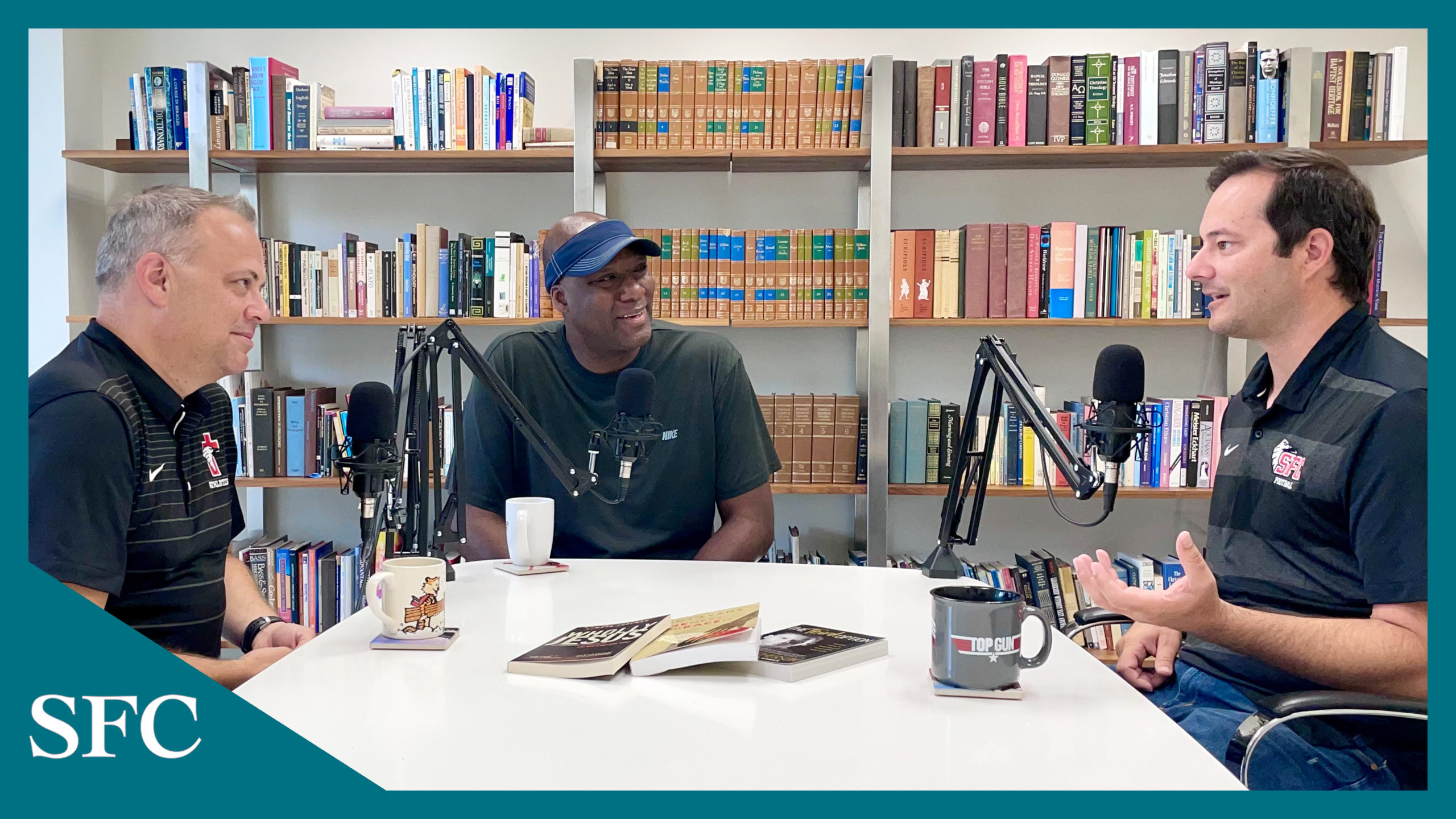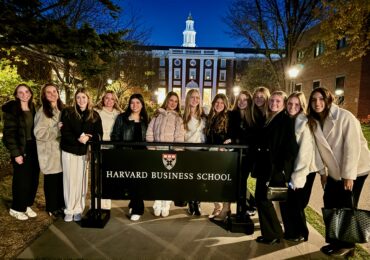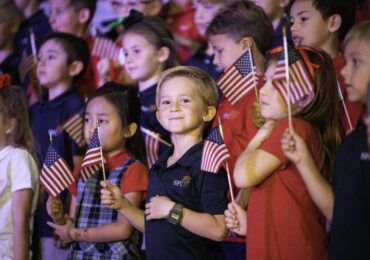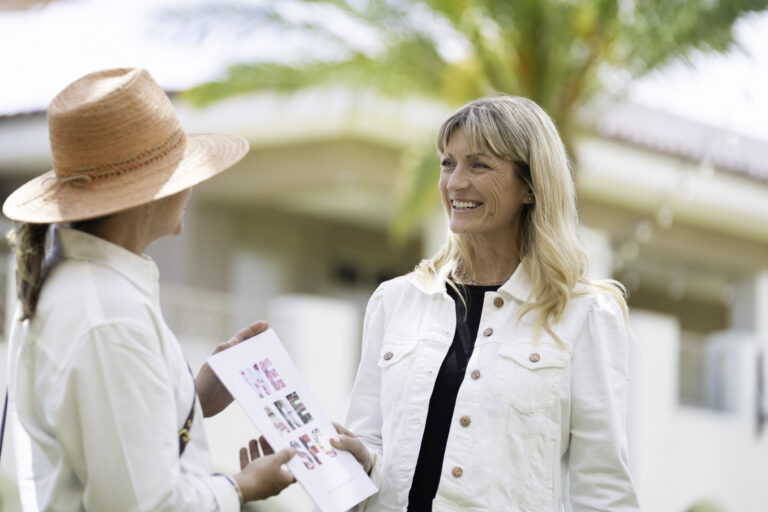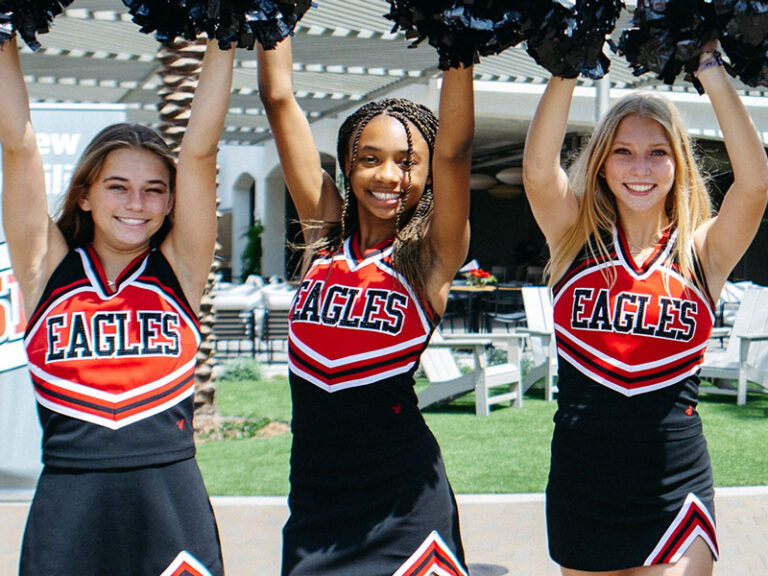Episode Show Notes
In this episode, Mike and Rod are joined by Willie Briscoe, SFC father and founder of the Hope Leadership Academy, to discuss race and the importance of giving children the knowledge and vocabulary to talk about the topic in a healthy manner and from a biblical standpoint.
Mike Siciliano, High School Dean of Students, has a long history with Sante Fe Christian, sitting in several roles including alumnus, US history teacher, and football coach. As a student, Siciliano felt he had teachers and coaches who personally invested in him and made a huge difference in his life. Now, he tries every day to continue that legacy for current SFC students, live up to the standard his teachers set for him, and have a lot of fun.
Rod Gilbert brings a fresh perspective as SFC’s Head of Schools. As a strong leader with a shepherd’s heart, Rod encourages SFC’s faculty, coaches, and staff to strive for excellence in all they do. At his core, Rod is an educator who wants children and their parents to see the world as something lovely, worth exploring and redeeming through Christ.
Willie Briscoe, SFC father and founder of the Hope Leadership Academy, grew up in Portland, Oregon with his mother, brother and two older sisters. He became a Christian in 1999 when he attended school at Point Loma Nazarene University. After graduating with his Bachelor’s degree, Willie started a small personal training business in North County San Diego, and for three years provided a steady income for his growing family. It was during this time when his pastor challenged him to prayerfully consider his next move and inquire if he was using his gifts in the best capacity. After several weeks of prayer and a short-term mission trip to Malawi, Willie launched the Hope Leadership Academy (HLA) in 2010. Willie’s greatest passion is spending time with his beautiful wife Kaci, and their three beautiful children.
Highlights
00:00:00 – Introductions
00:02:09 – Why this conversation is being held
00:04:10 – Fears surrounding discussion about race and consequences of not discussing it
00:05:01 – Tendency of humans to think of worst-case scenario
00:06:34 – Impact of social media on meaningful conversations
00:07:41 – Best answer to give to people who are uncomfortable with the topic of race
00:09:15 – Exploration of difficulties for people of color inside or outside of SFC
00:11:25 – How to respond to someone who says, “I want to be known for who I am”
00:13:35 – What Willie Briscoe likes about The Third Option
00:16:04 – Rod Gilbert’s journey through these waters over the past year and a half
00:18:18 – Discussion of The Third Option
Transcript
Mike Siciliano [00:00:07] Welcome to another episode of our Eagle Perspective Podcast. We are glad to have you back. I’m joined once again by our Head of Schools, Rod Gilbert.
Rod Gilbert [00:00:14] Hi, Mike. Thanks for having me.
Mike Siciliano [00:00:15] I’m Mike Siciliano. It’s good to be here. We have a guest today, Willie Briscoe.
Willie Briscoe [00:00:19] Thanks for having me.
Mike Siciliano [00:00:20] Willie, thanks for being here. Willie is a dad here. Willie is the founder and director of the Hope Leadership Academy. You want to tell our audience a little bit about yourself?
Willie Briscoe [00: 00:28] Yeah. Like you said, my name is Willie Briscoe. I have three students here — high school, middle school, and elementary. Invested father. I guess I’m called a unicorn. I serve in a ministry called Hope Leadership Academy, which serves underserved students and kids in southeast San Diego that come from primarily broken, fatherless homes. We seek to introduce them to their Heavenly Father and then bridge all the challenges and the barriers that they have to success. Love serving in the community of San Diego and love being a part of Santa Fe Christian.
Mike Siciliano [00:01:05] Well, we love having you. We’ve partnered with you and your organization a few times now. I’m right that you are getting pretty much the complete SFC experience right now. You have a lower school student, a middle school student, and an upper school student.
Willie Briscoe [00:01:18] Exactly, yeah.
Mike Siciliano [00:01:19] You get all the emails.
Willie Briscoe [00: 01:20] All the emails.
Rod Gilbert [00:01:19] That’s why we call them unicorns. There’s always about 40 families like that.
Willie Briscoe [00:01:24] Exactly. Except I make my wife get the emails so I’m not responsible for the information.
Mike Siciliano [00:01:28] Good strategy.
Willie Briscoe [00:01:29] I say, “Because you get the emails, just put them on my calendar.” We have all three kids, and they’re all having a great time and experience in each school and the uniqueness of each school at Santa Fe Christian.
Mike Siciliano [00:01:42] Well, thank you for joining us. Today we’re going to talk about the topic of race. It is a topic that oftentimes feels like there’s so much intensity and tension around it. It’s interesting, because the three of us for the last year and a half have been doing this, and I think every time we do it maybe the temperature goes down a little bit. That’s felt good, I know, for me.
Rod Gilbert [00:02:05] It’s been good for me, too.
Mike Siciliano [00:02:09] I guess I’ll start with probably a question I think a lot of people have asked us as we talk about this and that maybe they see the topic of this podcast and comes to their head, which is: why are we having this conversation?
Rod Gilbert [00:02:22] I think at its core as a Christian school we need to be earnestly and carefully loving children enough to teach them these things. As Christians there is one human race, but we are different. We have differences. To not address these things, especially when the world is so torn up about it. We owe it to the children to talk about these topics from a biblical standpoint and give them vocabulary and a place to talk about things in a healthy way, in a way they can have good relationships. The three of us have had good conversations as three adult men, and sometimes it takes a while for us to talk through things. For three eight-year-olds I want the same for them. I can’t see any downside to that.
Willie Briscoe [00:03:11] Yeah, I agree. I think the world is dealing with this; our kids are dealing with it; and they’re dealing with it in the social media space. If we don’t help them label it, the enemy sees that void, and he steps right in, and he helps them label it a lot of times in the way that we wouldn’t want them to, and wouldn’t have the biblical perspective that we want our children to have. They’re wrestling with these things. In their wrestling we want to help provide the parameters by which they can really learn who they are in Christ around this issue. Sometimes it’s difficult. But to your point, Mike, I think the most difficult conversation is the first one to have about these conversations. It’s the first one. Then once you recognize you’re safe and you’re in an environment with people that really do want to learn and not just share their point of view, once you understand you’re safe in that environment, then everything else becomes a lot easier.
Mike Siciliano [00:04:10] Yeah. I think right now there’s a fear that if I say the wrong thing, I’ll be forever labeled one thing or the other. Our reaction to that as humans sometimes is, “Well, then I’m just not going to say anything. Let’s just not talk about it.” But I think, to be honest, one of the things we’ve maybe learned in our community is that there are consequences to not talking about it and not addressing it, as well.
Rod Gilbert [00:04:35] Willie was saying this earlier, that if you don’t address a bad thought or a bad understanding with someone — I’m just trying to use simple words for kids, too — it can fester. That’s not new to race. That’s actually common in marriages and in our own relationships with our children. This is a human relationships thing. This one has particular interest for us, so we have to talk about it.
Willie Briscoe [00:05:01] Once again, I think that’s where the enemy does his greatest work, in those voids. He drives that wedge a little bit deeper. As a human race we don’t automatically think the best possible ideas about something where there’s a void; we think the worst-case scenario. We imagine that text message…
Rod Gilbert [00:05:23] Why do we do that? Are we just weird?
Willie Briscoe [00:05:25] We just do. It’s our endemic nature. It’s our nature.
Rod Gilbert [00:05:28] Are we just fatalists or something?
Willie Briscoe [00:05:30] We assume that text message or that email in the worst tone, and we do that, also, when we have conversations — or lack of conversations — around race. We look at an expression. We look at someone’s just passing phrase or word to us, and we just assume the worst about that person. God has a lot to say in his word about that.
Rod Gilbert [00:05:54] Was that true 15, 20 years ago? People always assumed the… The word trigger has become part of it. I wouldn’t have used that word two years ago. Do you think it’s worse now?
Willie Briscoe [00:06:04] I think social media has changed a little bit. I think the ability to say quick tidbits of information and have accountability as opposed to sitting on the porch or sitting and having coffee with someone and actually hearing their words. The Bible says be quick to listen. We’re not quick to listen. We’re quick to speak and quick to talk. I think that’s just changed. Our kids, they’ve only grown up in that environment.
Rod Gilbert [00:06:33] It’s the digital citizenry.
Willie Briscoe [00:06:34] Exactly. You ask them a question, and they hit Google, and they tell you what’s truth and what’s not truth and whether it’s true or not. I think it has impacted the ability to sit down and have genuine conversations and get to know people. That gives the latitude to what you’re saying, Mike. That gives latitude to having someone make an off-color comment, or joke, or something and giving them the room to repair that and have conversation. But if it just comes across in the social media, then I make all sorts of diagnosis about who that person is and judgment, and then I just cut them off. We’re also in a very cut-off community society right now.
Rod Gilbert [00:07:14] We just write people off.
Mike Siciliano [00:07:16] What I would say about that is when that happens, that doesn’t give me or whoever’s making the comment a chance to learn how something I said or did that I didn’t intend to come across a certain way maybe had an impact that was different than I thought. Then we get in this cycle a little bit of distrust, and assigning motive, and things that aren’t helpful.
Willie Briscoe [00:07:37] Or labeling. Labeling is dangerous.
Mike Siciliano [00:07:41] Willie, what would you say as someone who’s in our community, has been in our community for a while, who will, hopefully, Lord willing, be in our community for a long time, to people who are saying, “Gosh, I wish they weren’t talking about this?” What’s the best answer that we can give them?
Willie Briscoe [00:07:57] Yeah. I think it goes back to that original comment: our kids are dealing with it; the world is dealing with it. As a Christian school and part of the Christian community we’re called… The Bible says that we have been given the opportunity of reconciliation. That’s a biblical mandate. If we’re not reconciling… First, that means reconciling the world to Jesus, but that also means reconciling other issues. If we’re not actively pursuing reconciling these things out in front of a world that is going to label it and go down the wrong road, then we leave those things up to chance, and we know there’s a negative consequence to that. In my own home it’s really about teaching my kids how to deal with these things on a daily basis. As a father of three kids that deal with it sometimes on a daily basis — not necessarily at Santa Fe Christian but in the community that looks very different than they do — I want to give them words; I want to give them real labels; and I want to give them a voice in that space. The worst thing I can do is leave that void and that cognitive dissonance where they don’t know where to file things, because that generally turns into anger, resentment and creates a lot of dissension and a lack of unity.
Mike Siciliano [00:09:15] This might seem like a simple question or maybe a silly question, but have there been difficulties for you and your family or other families of color at Santa Fe, not through intent, but just that are challenges that you’ve had to address that if through this conversation that we’re having will make it easier for them or better for them to be at Santa Fe?
Willie Briscoe [00:09:41] At every level my kids or our family have dealt with incidents or issues. I would honestly say most of the time it has been resolved, and everything has just been great, and it’s been a wonderful learning opportunity. Then there’s been other things that have taken other steps to reconcile and to work on. Santa Fe Christian is no different than any other institution, or organization, or church. There’s just different people with different cultures. One incident is where my youngest son, a little boy that loves him and a family that loves us, told my son, “Hey, kids that have your color can’t play this game with us.” When the mom heard, she was mortified. She reached out to us on multiple levels. and made play dates, and reconciled, and…
Rod Gilbert [00:10:33] How old were they?
Willie Briscoe [00:10:34] Well, they were in first grade. That kid didn’t learn that at home. It’s something that just rolled out of his mouth. But at the same time, that family was just mortified. My wife and I, we were laughing about it, because we knew the family, we knew the kid. We know the differences between racism, prejudice, and just sometimes just a lack of understanding or knowing. Kids say the darndest things. They do. We were able to work that out and have play dates with the kids. The parents were adamant about teaching their kids why you don’t say things like that. We have to deal with it. If we don’t deal with it biblically, once again, I think that leaves room for the enemy to label them and speak for us in that area.
Rod Gilbert [00:11:16] And do real damage. I have a question, if you don’t mind. Can I go?
Mike Siciliano [00:11:22] You’re my boss. You can always go.
Rod Gilbert [00:11:25] I’m sure we’ve talked about it at some point in our time together. But I heard from some alum in the fall that we were talking with, and then I had comments from minority children here, as well. I’m going to just say the composite quote, because I think it represents a true heart. We’ll have a minority student say, “I don’t want to be invisible as who I am. I want to be known for who I am, and I don’t want to just be invisible in the room.” If I have a group of minority kids with me, how do I address that, or what do they mean by that? It’s a true expression. They want to be seen for who they are.
Willie Briscoe [00:12:08] Yeah. I think, once again, giving them a voice and a safe place to have a voice. The reality is that even the word minority itself depicts the fact that they are a small percentage of a larger group of people, and you can’t really turn that upside down just to make us a group of people. That’s not realistic. I don’t think that’s what we’re called to do. But I think being aware and being sensitive, because at least in my own kids’ perspective yes, they want to be heard and they want to be seen for who they are, but it’s the offhand comments and some of the cultural biases that kids bring from home and have just said in their presence that have really hurt them. I think that’s part of the process is just creating space where… I had a conversation with one of the coaches about this. He asked me almost the same question. He said, “If you allow some of these young students to see life from a different perspective and a different culture, I guarantee their eyes will be opened, and some of those comments, some of those phrases, some of those thoughts won’t even cross their mind anymore.” I think there’s definitely hope. It’s not a huge problem, but we’re addressing them because the world and the community is addressing it.
Rod Gilbert [00:13:35] Well, I like what you started with: we are training our children, and we have to give them a grid or a way to process things. If we don’t train them with specifics about how to love one another and understand each other, the enemy will fill in that gap. As fathers if we don’t stand at the gap, it’s an Ezekiel passage, something bad will get in there. I want to shift to a different question. When we started having this conversation last summer… I’m a bit of a nerd, so I’ve got a whole bunch of books on it. I tend to do that. Just like my little friends. We’ve all been reading The Third Option, and I’ve gotten to know Miles through that conversation. You had mentioned to me first early that you really liked Tony Evans’ book. I went through that last fall. What stands out in that book to you that…? I heard you quoted it a few minutes ago before we were on camera, so what do you like about it?
Willie Briscoe [00:14:29] Tony has a oneness phrase that he uses which is pretty positive, and I think with Tony he wants people to see each individual as God sees them. When you give that sort of value to each individual as God gives value, it’s hard for you to put down or to depict people as different than what God created them to be. What I love about Tony — and I love Miles McPherson’s book, as well — is he creates his thoughts on biblical doctrine and theology that go back. It gives value to the African American culture, even the Middle Eastern culture, where I think if you give that value and you see where Africans were in historical places, biblical places, then some of the false ideologies about blacks or other cultures can be dismissed. I love that, and I love that he builds it off of places that I can go back to Scripture and see, and follow up, and hold them accountable.
Rod Gilbert [00:15:47] Well, tell them they need to come up with a new, updated version. I tried to get a whole bunch of copies of it and couldn’t find that many. Well, this is just 2015. Call him. You know people there. Let you write the foreword to the next one.
Willie Briscoe [00:16:03] That would be dangerous.
Mike Siciliano [00:16:04] Rod, maybe you want to talk a little bit about your journey through this as the Head of Schools. There’s so much stuff out there right now to read on this. There are so many ideas of what the solution is or even what the problem is. But maybe you can share a little about your journey over the past year and a half or so, and how you’ve processed all that, and what you’re thinking about as you’ve digested all that.
Rod Gilbert [00:16:29] I’d love to do that. We had a lot of heartache among alum last summer that you and I met on Zoom. It was very normal. Most every private school in the country had a situation like this. As we were listening to those voices, it tenderized my heart. It wasn’t like it was anti-SFC; it was just a callout of let’s do something. My tendency as a leader is to go slow and make sure there’s follow-through for years and years and years. When I reached out to Willie, he had said, “Whatever you do, Rod, go slow. If you think you’re going too slow, you’re probably not.” That fit my Crock-Pot style. But in my heart I wanted to get the school’s conversation to a place where it’s healthy, and not shrill, and not Twitter filled. The negotiating of that in my own heart was hard. We had all the teachers get a copy of Mile’s book, and then we had two pilot groups that went through some of the exercises. I got good feedback from the teachers. Willie and I stayed in touch through that. In my heart I thought, “If 160 employees can learn to just talk about these things as a community in our hallways and in our mentoring sort of way, that will have an ever flowing impact on the children, and the moms, and dads. If 160 employees could just say we love talking about this from a biblical standpoint.” That’s the slow process. The board read through The Third Option last year and were cheering me on on it.
Mike Siciliano [00:18:18] I think it’d be helpful to talk a little bit about The Third Option just for a minute, because there’s so much out there in the way of curriculum. I think there’s a group of people who say, “Oh, my gosh, is there some curriculum that’s telling us how to think about this issue, and it’s a certain way, and is it biblical?” To me, it’s felt like The Third Option has been really good at number one, grounding everything biblically and number two, providing a way for us to just share our stories, and to personalize and humanize this, and get a little out of the… He starts with this is spiritual, not political. We aren’t going to get into the political stuff. We’re not talking about systems; we’re talking about our relationships.
Rod Gilbert [00:19:04] We’re not talking about critical race theory.
Mike Siciliano [00:19:07] Critical race theory is a big thing, and it’s out there right now.
Rod Gilbert [00:19:12] It should be, because it’s a hot topic, but I think it has no place in any conversation in the K-12 world at all.
Mike Siciliano [00:19:19] Just to be clear, we’re not going to be putting critical race theory in front of our students, or teachers, or anything like that?
Rod Gilbert [00:19:26] No. That was last summer’s conversation. That’s so last summer. No, it just wouldn’t make any sense. I talked to Miles about three weeks ago, and I said, “You’re good on camera. You’re good at what you do.” He’s a funny guy. I liked one of his opening points when he said… When he introduced the conversations, he said, “This is more biblical similarities training.” When he cued it up that way, a lot of the discussions were what we have in common. It was just so helpful to hear people’s stories. I thought, “We’re getting somewhere on this.”
Mike Siciliano [00:20:09] That’s not to say we’re ignoring the differences.
Rod Gilbert [00:20:12] Gosh, no.
Mike Siciliano [00:20:20] In fact, he talks about celebrating uniqueness, but it is in our similarities through those differences that we all can come together united in Christ. All right. Well, as is usually the case when we get together, we’re talking longer than I think we had thought we were going to.
Rod Gilbert [00:20:28] This has been fun.
Mike Siciliano [00:20:30] I’d just like to tell our listeners we’re going to break this into two episodes. This will be the end of episode one. Please join us for episode two of this discussion. We look forward to seeing you back with us.
